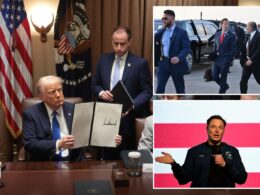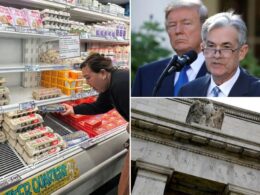Americans will likely have to pay more at the supermarket counter within the coming days while higher prices on everything from sneakers to furniture to cars could be felt in a matter of weeks following President Trump’s tariffs rollout, economists and industry experts told The Post.
Trump’s announcement on Wednesday triggered fears of a global trade war and sent stocks on Wall Street cratering – stoking economic uncertainty and leaving consumers with questions about which products to buy before they get sticker shock.
The 10% across-the-board tariffs begin Saturday, while the higher reciprocal tariffs against the nation’s largest trading partners go into effect Wednesday.
Dr. Sung Won Sohn, a distinguished economist and academic at Loyola Marymount University in Los Angeles, told The Post that grocery items that are imported will be more expensive in the short term.
“We import 80% of avocados that we consume in America and those are perishable items, so they will be more expensive immediately,” Sohn told The Post.
Sohn said that other staple items that the US doesn’t produce domestically such as coffee, tea and bananas will also become more expensive rather quickly.
Trump also slapped a 25% tariff on all imported vehicles that began Thursday. A 25% levy on auto parts begins May 3.
It could take weeks or months for the tariffs on foreign-made cars to be passed along since there is already an existing inventory that has yet to be emptied out, Sohn said.
Washers and dryers like those made by Korean conglomerates Samsung and LG fall into the same “intermediate” bucket as cars, he added.
“They have inventory so as a result prices don’t have to go up right away,” he Sohn, though he added that car dealerships “may not give you discounts that they normally would” as a result of tariffs.
But David Warrick, executive vice president of the enterprise division at Overhaul, a company specializing in supply chain visibility and risk management solutions, told The Post that price hikes on cars could come sooner than expected.
“For industries like automotive, electronics, and pharmaceuticals, where global component sourcing is deeply embedded, this will be felt almost immediately,” Warrick said.
“Expect higher input costs, margin pressure, and difficult decisions about what gets passed on to consumers.”
Ryan Monarch, assistant professor of economics at Syracuse University, added that products whose import is “closer to the final consumer” such as clothing, apparel, furniture, toys and shoes can expect to see higher prices “fairly quickly, like in the next month or two.”
“The more complicated the product is, the longer it’s going to take for these price increases to show up,” Monarch told The Post.
Housing materials will also be more expensive due to tariffs on lumber, steel and aluminum — but it could take up to 6 months for those price hikes to show up, according to Monarch.
Sohn said that he expects capital goods such as earth-moving equipment and heavy machinery to fall into the “third bucket” of goods whose prices won’t increase for at least a year.
“Those items are in stock and I don’t think their prices would be affected right away,” he said.
Meanwhile, the rollout of the tariffs are likely to sow confusion at the ports, which could snarl supply chains and cause shortages not seen since the COVID era, according to one economist.
“A lot of the products at the ports could get stalled so people don’t think about it, these are complicated tariffs to implement,” Michael Szanto, a Fort Lauderdale, Fla.-based economist, told The Post.







